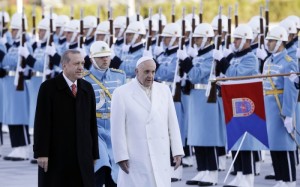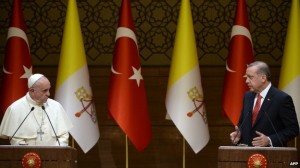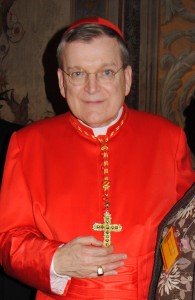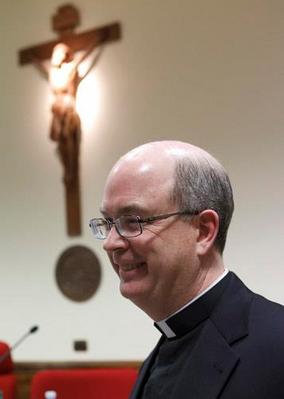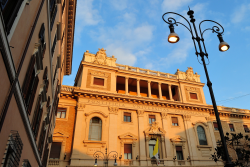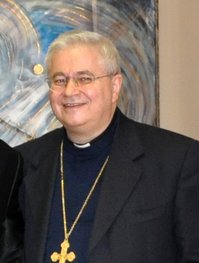The Pope offers us a yearly letter for the World Day of Peace celebrated on January 1 of the new year. This year’s theme is “Educating Young People in Justice and Peace.” His hope is that the “conviction that the young, with their enthusiasm and idealism, can offer new hope to the world.” Indeed. we need their witness and work to be agents of justice and peace today. The letter sets an important course for us in whatever we do in life. Emphasis in the text is my own.
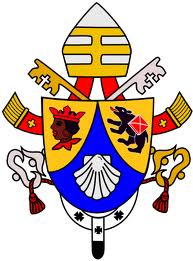
1. THE BEGINNING OF A NEW YEAR, God’s gift to humanity, prompts me to extend to all, with great confidence and affection, my heartfelt good wishes that this time now before us may be marked concretely by justice and peace.
With what attitude should we look to the New Year? We find a very beautiful image in Psalm 130. The Psalmist says that people of faith wait for the Lord “more than those who watch for the morning” (v. 6); they wait for him with fi rm hope because they know that he will bring light, mercy, salvation. This waiting was born of the experience of the Chosen People, who realized that God taught them to look at the world in its truth and not to be overwhelmed by tribulation. I invite you to look to 2012 with this attitude of confident trust. It is true that the year now ending has been marked by a rising sense of frustration at the crisis looming over society, the world of labour and the economy, a crisis whose roots are primarily cultural and anthropological. It seems as if a shadow has fallen over our time, preventing us from clearly seeing the light of day.
In this shadow, however, human hearts continue to wait for the dawn of which the Psalmist speaks. Because this expectation is particularly powerful and evident in young people, my thoughts turn to them and to the contribution which they can and must make to society. I would like therefore to devote this message for the XLV World Day of Peace to the theme of education: “Educating Young People in Justice and Peace”, in the conviction that the young, with their enthusiasm and idealism, can offer new hope to the world.
My Message is also addressed to parents, families and all those involved in the area of education and formation, as well as to leaders in the various spheres of religious, social, political, economic and cultural life and in the media. Attentiveness to young people and their concerns, the ability to listen to them and appreciate them, is not merely something expedient; it represents a primary duty for society as a whole, for the sake of building a future of justice and peace.
It is a matter of communicating to young people an appreciation for the positive value of life and of awakening in them a desire to spend their lives in the service of the Good. This is a task which engages each of us personally.
The concerns expressed in recent times by many young people around the world demonstrate that they desire to look to the future with solid hope. At the present time, they are experiencing apprehension about many things: they want to receive an education which prepares them more fully to deal with the real world, they see how difficult it is to form a family and to find stable employment; they wonder if they can really contribute to political, cultural and economic life in order to build a society with a more human and fraternal face.
It is important that this unease and its underlying idealism receive due attention at every level of society. The Church looks to young people with hope and confidence; she encourages them to seek truth, to defend the common good, to be open to the world around them and willing to see “new things” (Is 42:9; 48:6).
Educators
2. Education is the most interesting and difficult adventure in life. Educating – from the Latin educere – means leading young people to move beyond themselves and introducing them to reality, towards a fullness that leads to growth. This process is fostered by the encounter of two freedoms, that of adults and that of the young. It calls for responsibility on the part of the learners, who must be open to being led to the knowledge of reality, and on the part of educators, who must be ready to give of themselves. For this reason, today more than ever we need authentic witnesses, and not simply people who parcel out rules and facts; we need witnesses capable of seeing farther than others because their life is so much broader. A witness is someone who first lives the life that he proposes to others.
Where does true education in peace and justice take place? First of all, in the family, since parents are the first educators. The family is the primary cell of society; “it is in the family that children learn the human and Christian values which enable them to have a constructive and peaceful coexistence. It is in the family that they learn solidarity between the generations, respect for rules, forgiveness and how to welcome others.”1 The family is the first school in which we are trained in justice and peace. We are living in a world where families, and life itself, are constantly threatened and not infrequently fragmented. Working conditions which are often incompatible with family responsibilities, worries about the future, the frenetic pace of life, the need to move frequently to ensure an adequate livelihood, to say nothing of mere survival – all this makes it hard to ensure that children receive one of the most precious of treasures: the presence of their parents. This presence makes it possible to share more deeply in the journey of life and thus to pass on experiences and convictions gained with the passing of the years, experiences and convictions which can only be communicated by spending time together. I would urge parents not to grow disheartened! May they encourage children by the example of their lives to put their hope before all else in God, the one source of authentic justice and peace.
I would also like to address a word to those in charge of educational institutions: with a gr
eat sense of responsibility may they ensure that the dignity of each person is always respected and appreciated. Let them be concerned that every young person be able to discover his or her own vocation and helped to develop his or her God-given gifts. May they reassure families that their children can receive an education that does not conflict with their consciences and their religious principles.
Every educational setting can be a place of openness to the transcendent and to others; a place of dialogue, cohesiveness and attentive listening, where young people feel appreciated for their personal abilities and inner riches, and can learn to esteem their brothers and sisters. May young people be taught to savour the joy which comes from the daily exercise of charity and compassion towards others and from taking an active part in the building of a more humane and fraternal society.
I ask political leaders to offer concrete assistance to families and educational institutions in the exercise of their right and duty to educate. Adequate support should never be lacking to parents in their task. Let them ensure that no one is ever denied access to education and that families are able freely to choose the educational structures they consider most suitable for their children. Let them be committed to reuniting families separated by the need to earn a living. Let them give young people a transparent image of politics as a genuine service to the good of all.
I cannot fail also to appeal to the world of the media to offer its own contribution to education. In today’s society the mass media have a particular role: they not only inform but also form the minds of their audiences, and so they can make a significant contribution to the education of young people. It is important never to forget that the connection between education and communication is extremely close: education takes place through communication, which influences, for better or worse, the formation of the person.
Young people too need to have the courage to live by the same high standards that they set for others. Theirs is a great responsibility: may they find the strength to make good and wise use of their freedom. They too are responsible for their education, including their education in justice and peace!
Educating in truth and freedom
3. Saint Augustine once asked: “Quid enim fortius desiderat anima quam veritatem? – What does man desire more deeply than truth?”2 The human face of a society depends very much on the contribution of education to keep this irrepressible question alive. Education, indeed, is concerned with the integral formation of the person, including the moral and spiritual dimension, focused upon man’s final end and the good of the society to which he belongs. Therefore, in order to educate in truth, it is necessary first and foremost to know who the human person is, to know human nature. Contemplating the world around him, the Psalmist reflects: “When I see the heavens, the work of your hands, the moon and the stars which you arranged, what is man that you should keep him in mind, mortal man that you care for him?” (Ps 8:4-5). This is the fundamental question that must be asked: who is man? Man is a being who bears within his heart a thirst for the infinite, a thirst for truth – a truth which is not partial but capable of explaining life’s meaning – since he was created in the image and likeness of God. The grateful recognition that life is an inestimable gift, then, leads to the discovery of one’s own profound dignity and the inviolability of every single person. Hence the first step in education is learning to recognize the Creator’s image in man, and consequently learning to have a profound respect for every human being and helping others to live a life consonant with this supreme dignity. We must never forget that “authentic human development concerns the whole of the person in every single dimension”,3 including the transcendent dimension, and that the person cannot be sacrificed for the sake of attaining a particular good, whether this be economic or social, individual or collective.
Only in relation to God does man come to understand also the meaning of human freedom. It is the task of education to form people in authentic freedom. This is not the absence of constraint or the supremacy of free will, it is not the absolutism of the self. When man believes himself to be absolute, to depend on nothing and no one, to be able to do anything he wants, he ends up contradicting the truth of his own being and forfeiting his freedom. On the contrary, man is a relational being, who lives in relationship with others and especially with God. Authentic freedom can never be attained independently of God.
Freedom is a precious value, but a fragile one; it can be misunderstoo
d and misused. “Today, a particularly insidious obstacle to the task of educating is the massive presence in our society and culture of that relativism which, recognizing nothing as definitive, leaves as the ultimate criterion only the self with its desires. And under the semblance of freedom it becomes a prison for each one, for it separates people from one another, locking each person into his or her own self. With such a relativistic horizon, therefore, real education is not possible without the light of the truth; sooner or later, every person is in fact condemned to doubting the goodness of his or her own life and the relationships of which it consists, the validity of his or her commitment to build with others something in common.”4
In order to exercise his freedom, then, man must move beyond the relativistic horizon and come to know the truth about himself and the truth about good and evil. Deep within his conscience, man discovers a law that he did not lay upon himself, but which he must obey. Its voice calls him to love and to do what is good, to avoid evil and to take responsibility for the good he does and the evil he commits.5 Thus, the exercise of freedom is intimately linked to the natural moral law, which is universal in character, expresses the dignity of every person and forms the basis of fundamental human rights and duties: consequently, in the final analysis, it forms the basis for just and peaceful coexistence.
The right use of freedom, then, is central to the promotion of justice and peace, which require respect for oneself and others, including those whose way of being and living differs greatly from one’s own. This attitude engenders the elements without which peace and justice remain merely words without content: mutual trust, the capacity to hold constructive dialogue, the possibility of forgiveness, which one constantly wishes to receive but finds hard to bestow, mutual charity, compassion towards the weakest, as well as readiness to make sacrifices.
Educating in justice
4. In this world of ours, in which, despite the profession of good intentions, the value of the person, of human dignity and human rights is seriously threatened by the widespread tendency to have recourse exclusively to the criteria of utility, profit and material possessions, it is important not to detach the concept of justice from its transcendent roots. Justice, indeed, is not simply a human convention, since what is just is ultimately determined not by positive law, but by the profound identity of the human being. It is the integral vision of man that saves us from falling into a contractual conception of justice and enables us to locate justice within the horizon of solidarity and love.6
We cannot ignore the fact that some currents of modern culture, built upon rationalist and individualist economic principles, have cut off the concept of justice from its transcendent roots, detaching it from charity and solidarity: “The ‘earthly city’ is promoted not merely by relationships of rights and duties, but to an even greater and more fundamental extent by relationships of gratuitousness, mercy and communion. Charity always manifests God’s love in human relationships as well, it gives theological and salvific value to all commitment for justice in the world.”7
“Blessed are those who hunger and thirst for righteousness, for they shall be satisfied” (Mt 5:6). They shall be satisfied because they hunger and thirst for right relations with God, with themselves, with their brothers and sisters, and with the whole of creation.
Educating in peace
5. “Peace is not merely the absence of war, and it is not limited to maintaining a balance of powers between adversaries. Peace cannot be attained on earth without safeguarding the goods of persons, free communication among men, respect for the dignity of persons and peoples, and the assiduous practice of fraternity.”8 We Christians believe that Christ is our true peace: in him, by his Cross, God has reconciled the world to himself and has broken down the walls of division that separated us from one another (cf. Eph 2:14-18); in him, there is but one family, reconciled in love.
Peace, however, is not merely a gift to be received: it is also a task to be undertaken. In order to be tr
ue peacemakers, we must educate ourselves in compassion, solidarity, working together, fraternity, in being active within the community and concerned to raise awareness about national and international issues and the importance of seeking adequate mechanisms for the redistribution of wealth, the promotion of growth, cooperation for development and conflict resolution. “Blessed are the peacemakers, for they shall be called sons of God”, as Jesus says in the Sermon on the Mount (Mt 5:9).
Peace for all is the fruit of justice for all, and no one can shirk this essential task of promoting justice, according to one’s particular areas of competence and responsibility. To the young, who have such a strong attachment to ideals, I extend a particular invitation to be patient and persevering in seeking justice and peace, in cultivating the taste for what is just and true, even when it involves sacrifice and swimming against the tide.
Raising one’s eyes to God
6. Before the difficult challenge of walking the paths of justice and peace, we may be tempted to ask, in the words of the Psalmist: “I lift up my eyes to the mountains: from where shall come my help?” (Ps 121:1).
To all, and to young people in particular, I wish to say emphatically: “It is not ideologies that save the world, but only a return to the living God, our Creator, the guarantor of our freedom, the guarantor of what is really good and true … an unconditional return to God who is the measure of what is right and who at the same time is everlasting love. And what could ever save us apart from love?”9 Love takes delight in truth, it is the force that enables us to make a commitment to truth, to justice, to peace, because it bears all things, believes all things, hopes all things, endures all things (cf. 1 Cor 13:1-13).
Dear young people, you are a precious gift for society. Do not yield to discouragement in the face of difficulties and do not abandon yourselves to false solutions which often seem the easiest way to overcome problems. Do not be afraid to make a commitment, to face hard work and sacrifice, to choose the paths that demand fidelity and constancy, humility and dedication. Be confident in your youth and its profound desires for happiness, truth, beauty and genuine love! Live fully this time in your life so rich and so full of enthusiasm.
Realize that you yourselves are an example and an inspiration to adults, even more so to the extent that you seek to overcome injustice and corruption and strive to build a better future. Be aware of your potential; never become self-centred but work for a brighter future for all. You are never alone. The Church has confidence in you, follows you, encourages you and wishes to offer you the most precious gift she has: the opportunity to raise your eyes to God, to encounter Jesus Christ, who is himself justice and peace.
All you men and women throughout the world, who take to heart the cause of peace: peace is not a blessing already attained, but rather a goal to which each and all of us must aspire. Let us look with greater hope to the future; let us encourage one another on our journey; let us work together to give our world a more humane and fraternal face; and let us feel a common responsibility towards present and future generations, especially in the task of training them to be people of peace and builders of peace. With these thoughts I offer my reflections and I appeal to everyone: let us pool our spiritual, moral and material resources for the great goal of “educating young people in justice and peace”.
From the Vatican, 8 December 2011
BENEDICTUS PP XVI
___
Notes
1 BENEDICT XVI, Address to Administrators of Lazio Region and of the Municipality and Province of Rome (14 January 2011): L’Osservatore Romano, 15 January 2011, p. 7.
2 Commentary on the Gospel of John, 26, 5.
3 BENEDICT XVI, Encyclical Letter Caritas in Veritate (29 June 2009), 11: AAS 101 (2009), 648; cf. PAUL VI, Encyclical Letter Populorum Progressio (26 March 1967), 14: AAS 59 (1967), 264.
4 BENEDICT XVI, Address for the Opening of the Diocesan Ecclesial Meeting in the Basilica of Saint John Lateran (6 June 2005): AAS 97 (2005), 816.
5 Cf. SECOND VATICAN ECUMENICAL COUNCIL, Pastoral Constitution on the Church in the Modern World Gaudium et Spes, 16.
6 Cf. BENEDICT XVI, Address to the Bundestag (Berlin, 22 September 2011): L’Osservatore Romano, 24 September 2011, pp. 6-7.
7 ID., Encyclical Letter Caritas in Veritate, 6 (29 June 2009), 6: AAS 101 (2009), 644-645.
8 Catechism of the Catholic Church, No. 2304.
9 BENEDICT XVI, Address at Youth Vigil (Cologne, 20 August 2005): AAS 97 (2005), 885-886.
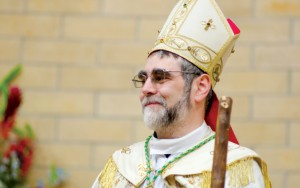 Testimony of Bishop Francis Kalabat from the St. Thomas the Apostle Chaldean Catholic Diocese
Testimony of Bishop Francis Kalabat from the St. Thomas the Apostle Chaldean Catholic Diocese